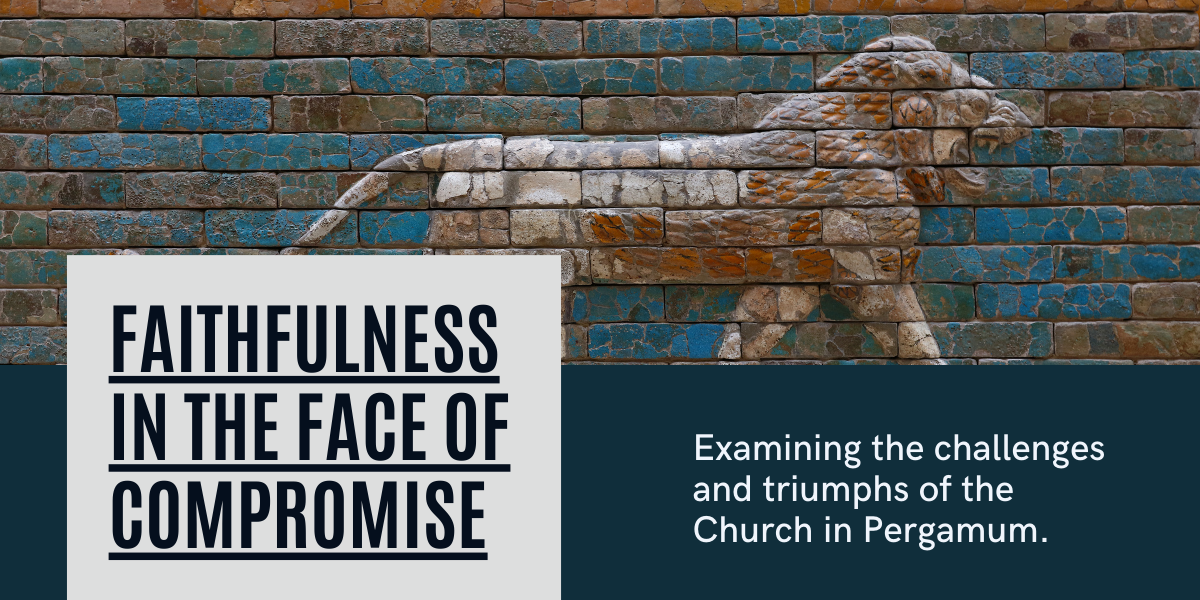
As David Levy said, “Compromise has been a cancer in the church from its inception.” In our ongoing journey through the Book of Revelation, we come to the letter addressed to the church in Pergamum. This letter, like all others, contains both commendation and rebuke from our Lord Jesus Christ. The church in Pergamum shows us a paradox of remaining faithful to Biblical convictions while also compromising those convictions to conform to society. In Revelation 2:12-17, we find profound lessons applicable to the church today.
The ancient city of Pergamum stands as a symbol of a church grappling with the challenges of its time. This city was described by Jesus as the place “where Satan dwells.” This imagery serves as a powerful reminder of the spiritual warfare that Christians have faced throughout history and continue to face today.
Pergamum was characterized by idolatry, pagan worship, and an intense devotion to the state, particularly the imperial cult. The Christians in Pergamum lived in a culture diametrically opposed to the teachings of Christ. As a result, they were persecuted for their faith in Jesus as Lord. The city’s allegiance to Caesar as a deity made it a challenging environment for early Christians to navigate.
I know where you dwell, where Satan’s throne is. Yet you hold fast my name, and you did not deny my faith even in the days of Antipas my faithful witness, who was killed among you, where Satan dwells.
Revelation 2:13
The church in Pergamum, located in a city under Satan’s influence, received commendation from Jesus for their perseverance amidst persecution. Jesus’ acknowledgment of their challenging circumstances highlights His intimate awareness of their struggles. Despite facing persecution and residing where Satan’s presence was palpable, the church remained steadfast in their commitment to Christ.
Jesus specifically praised the church in Pergamum for their refusal to renounce His name even in the face of death. Their loyalty to Christ, in the heart of a wicked city where death was a real threat, demonstrated exceptional faithfulness. This church’s resilience serves as a powerful example for believers today. It emphasizes the importance of standing firm in our faith regardless of external pressures.
But I have a few things against you: you have some there who hold the teaching of Balaam, who taught Balak to put a stumbling block before the sons of Israel, so that they might eat food sacrificed to idols and practice sexual immorality.
Revelation 2:14
One of the central themes in the message to the church in Pergamum is the danger of compromise. The church was admonished for allowing worldly influences to infiltrate its beliefs and practices. This rebuke highlights the danger of compromising core biblical truths for the sake of cultural acceptance or convenience.
The story of Balaam and the Nicolaitans serves as a warning that internal compromise can be more dangerous than external persecution. These false teachings symbolize the dangers of internal compromise that can erode the integrity of a faith community. Jesus rebuked the church for allowing theological and moral compromises to infiltrate their congregation.
The allure of cultural acceptance and the temptation to blend in with the prevailing practices of the city posed a grave danger to the church in Pergamum. This compromise threatens to erode the very foundations of their faith. By commending their faithfulness and addressing the issue of compromise, Jesus provided guidance that remains relevant for believers today.
Sadly, the Church today is not immune to such compromise. We see it manifested in various ways:
The greatest dangers to the Church, as Jesus points out, often arise from within. Churches often fail because of inward compromise. This happens when Biblical truth is sacrificed for cultural relevance or personal gain. The erosion of convictions and theological integrity poses a significant risk to Christ’s Church.
When we compromise truth to appease culture or water down our convictions to conform to society, we undermine the integrity of our witness. We become like salt that has lost its flavor, no longer preserving but blending in with the world around us.
In Revelation 2:16, Jesus calls the church in Pergamum to repent. It is a call that echoes through the ages to all believers. This verse stands as a pivotal reminder that despite the depths of compromise or the entanglement in false teachings and immoral practices, there is always an opportunity for redemption through repentance.
Jesus’ command to repent is both a warning and an invitation—a warning of the imminent judgment that comes from persisting in sin, and an invitation to return to the path of righteousness and holiness that characterizes the true followers of Christ. This call to repentance underscores the seriousness with which God views the purity of His church and the individual hearts of His followers. It highlights the continual need for self-examination and realignment with God’s Word.
Jesus promises a reward to those who repent of compromise and remain faithful to Him. This promise includes three symbolic elements: Hidden Manna, representing Christ nourishing believers spiritually as the Bread of Life; the White Stone, symbolizing acceptance and victory in Christ; and the New Name, likely signifying our transformed identity in Christ and our membership in His Kingdom.
Together, these promises to the conquerors in Revelation 2:17 offer a glimpse of the rich spiritual rewards awaiting those who resist compromise with the world, remain steadfast in their faith, and uphold the truth of the Gospel.
Living Out Our Identity in Christ: Called, Chosen, and Faithful says:
[…] Faithfulness isn’t about achieving perfection; it’s about consistently returning to God with a heart committed to Him, even in the face of setbacks. Picture faithfulness like a marathon, not a sprint—it’s a steady, lifelong journey where every step matters. It’s marked by persistence, resilience, and the willingness to keep moving forward even when challenges arise. Faithful believers aren’t flawless, but they are steadfast, continually trusting in God’s promises and striving to follow His ways. […]